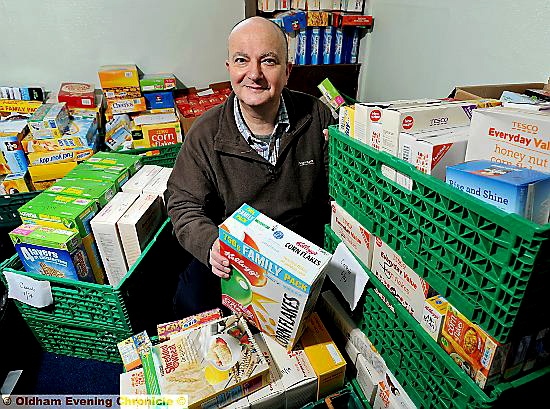Appetite for food handouts doubles
Date published: 18 April 2014

MASSIVE increase . . . Oldham Foodbank manager Andrew Barr
FOODBANK users in Oldham have more than doubled in the past financial year.
Almost 5,600 struggling Oldhamers, including 1,615 children, used the foodbank - which provides three days worth of emergency rations - in the past 12 months, up from 2,322 in 2012/2013.
More are being referred to the Trussell Trust Foodbank than at any time in its history.
Oldham Foodbank manager Andrew Barr said: “We have seen a massive increase, which shouldn’t be happening in the seventh-richest country in the world.
“But the reality is that life is very difficult for people on low incomes at the moment, and increasing numbers are struggling to make ends meet and are hitting a crisis where they cannot afford food.
“We don’t think anyone should have to go hungry, which is why we’re so grateful for the incredible generosity of local residents who donate heir food to us.
In the past year, locals have donated 56.9 tonnes of food to Oldham Foodbank, based on Clegg Street in the town centre, and over 50 have volunteered their help.
Oldham foodbank now has an additional distribution centre which operates from South Chadderton Methodist Church on Mondays and next month a distribution centre will open at the Salvation Army premises in Shaw manned by volunteers from Shaw Churches Together.
::TO be eligible for food, individuals are referred to the foodbank by a range of organisations and professions, including JobCentre Plus, GPs and the council.
OLDHAM East and Saddleworth MP Debbie Abrahams says the Trussell Trust’s report provides further evidence that the use of benefit sanctions needs to be examined by the Government.
Mrs Abrahams, a member of the Work and Pensions Select Committee, has been demanding the Government set up an independent inquiry into the “appropriateness” of sanctions, which can deny claimants benefits for long periods of time for relatively minor transgressions.
She said: “Around 65 per cent of the people coming to Oldham Foodbank for support were there because they were being affected by problems with their social security.”
Most Viewed News Stories
- 1Milan Bar in Lees and The Bank at Delph close doors with immediate effect
- 2Punch perfect Kyle is Oldham's latest national boxing champ
- 3Group wanted following attempted robbery incident on a tram in Shaw
- 4Five arrested after two young victims are robbed
- 5Shaw prospect Rafferty aims to shine at massive 'Ring Warriors Unleashed' show




